The Gods of the Hunt: Skadi and Ullr
When it comes to the approaching autumn, two gods I constantly associate with the cooling weather is Skadi and Ullr. Skadi and Ullr are two very powerful gods in our Northern pantheon, which is why it befuddles me that not a lot has survived when it comes to stories about these two gods.
Let’s Talk Skadi First
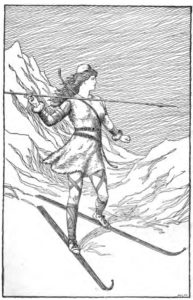 We know more about Skadi than Ullr, so I’ll talk about her first. Skadi is a Frost Giant (or Jotun) turned goddess and is the daughter of Þjazi. Skadi has a single story (although she and Loki argue in Lokasenna) on how she sought justice for the death of her father, Þjazi. Þjazi was the Jotun who tricked Loki into stealing Idunn and her Golden Apples from the gods.
We know more about Skadi than Ullr, so I’ll talk about her first. Skadi is a Frost Giant (or Jotun) turned goddess and is the daughter of Þjazi. Skadi has a single story (although she and Loki argue in Lokasenna) on how she sought justice for the death of her father, Þjazi. Þjazi was the Jotun who tricked Loki into stealing Idunn and her Golden Apples from the gods.
Skadi demanded to marry the god of her choice, plus someone had to make her laugh to fulfill the blood debt. Her demands were agreed on if she would choose her husband by looking at their feet only. Thinking she would choose Baldr, she chose the most beautiful feet–which belonged to Njord. Skadi couldn’t abide by the dreary coast, and Njord couldn’t stand the high mountaintops. So, theirs is an unhappy marriage.
Some Heathens have claimed that Skadi divorced Njord and chose Ullr, who would’ve been a better consort, but I haven’t seen anything in the literature to suggest that.
Ullr, the International Man of Mystery
 Now we come to Ullr, and by the gods, there isn’t a lot written up about him. Which is a shame, because Ullr was an important god in the Northern countries. Ullr is the god of wintertime sports and hunting. He is also the god of oaths; our ancestors swore on Ullr’s oath ring. Ullr was called on in duels, presumably to oversee the contest or to grant favor. He was also the head of Asgard when Odin was in exile for ten years.
Now we come to Ullr, and by the gods, there isn’t a lot written up about him. Which is a shame, because Ullr was an important god in the Northern countries. Ullr is the god of wintertime sports and hunting. He is also the god of oaths; our ancestors swore on Ullr’s oath ring. Ullr was called on in duels, presumably to oversee the contest or to grant favor. He was also the head of Asgard when Odin was in exile for ten years.
Beyond being handsome and fast on skis, the only other thing we know is that his home is called Ýdalir, meaning “yew dales.” This has given rise to the belief he was an archer, since bows were frequently made from yew. He is believed to be the god of winter sports and hunting. Nowadays, you can celebrate Ullr in December at Breckenridge, Colorado during Ullrfest, which celebrates snow, skiing, and the god, of course.
There has been some conjecture that Ullr may be another name for Tyr. The association is somewhat sketchy but you might be able to draw the conclusion due to people swearing their oaths on Ullr’s oath ring. And Tyr, who is often depicted more as the Aesir‘s second-in-command would be a more likely candidate to take over the throne of the All-Father while he was in exile, rather than Ullr. But even with these two examples, there aren’t any other obvious association between the two. In other words, we don’t know.
Unverified Personal Gnosis Time with Skadi and Ullr
 Before I go further with this, I want to caveat this by saying these are my experiences with these gods, and like anything, Your Mileage May Vary. I’ve had plenty of dealings with Skadi, but not Ullr. Back when I competed in a certain winter sport, Skadi and I held an uneasy truce. I was a lot more wary of her then, and while I know she is a very dangerous goddess, over the years I’ve come to understand her. She doesn’t suffer fools in her territory, so every time I am out in the backcountry, I am aware she could take me out.
Before I go further with this, I want to caveat this by saying these are my experiences with these gods, and like anything, Your Mileage May Vary. I’ve had plenty of dealings with Skadi, but not Ullr. Back when I competed in a certain winter sport, Skadi and I held an uneasy truce. I was a lot more wary of her then, and while I know she is a very dangerous goddess, over the years I’ve come to understand her. She doesn’t suffer fools in her territory, so every time I am out in the backcountry, I am aware she could take me out.
Still, Skadi has been a friend to me and my husband. (She smiles on him with a lot with animals.) Even so, I think I’ve gained some favor. I have had animals wait patiently while I get my equipment ready and even wait for me to shoot them. My offerings/blots go primarily to Skadi and Tyr, whom I consider my primary gods.
Ullr is still a concept to me. Maybe because I have gods that fulfill the roles he seems to have, I haven’t quite made the leap to adding him to my main gods. I do, however, remember him in my blots. So, maybe that’s good enough for him at the moment.
So, let me know about your own experiences with the hunting god/goddess in the comments!
—
A quick shout-out to Sarah Keene, who has helped make The Rational Heathen possible with her continued support!
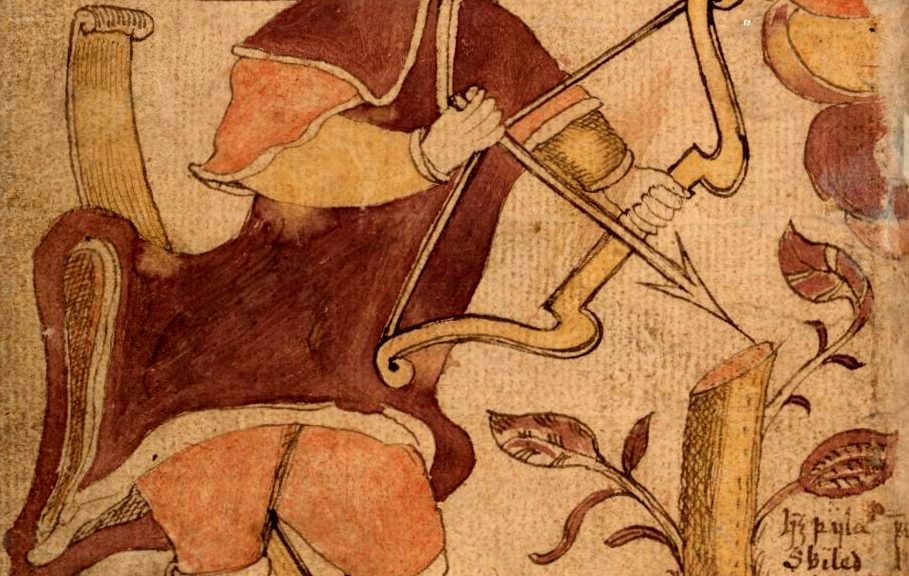
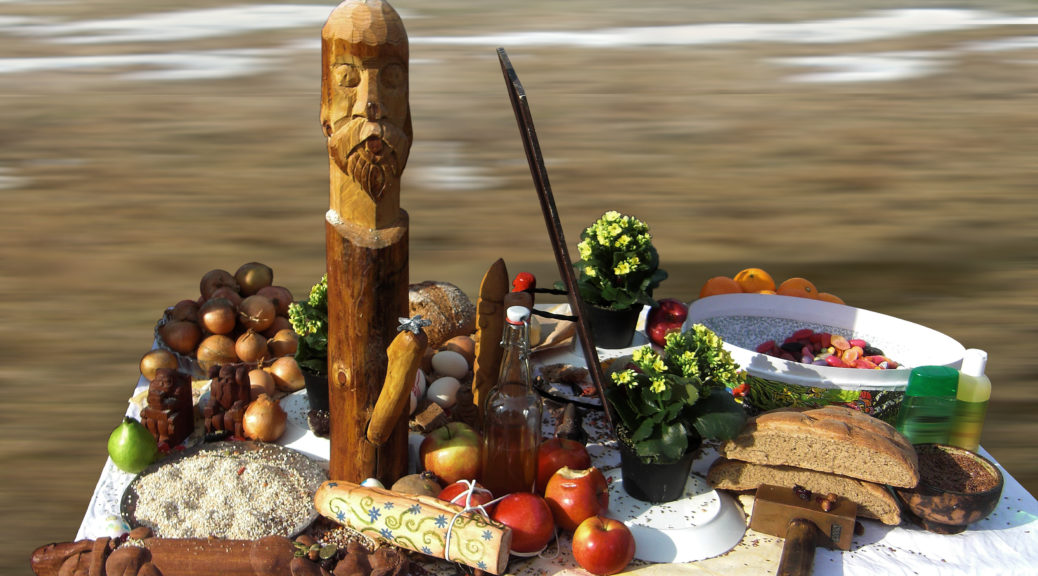
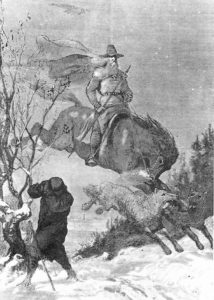 Choosing a god
Choosing a god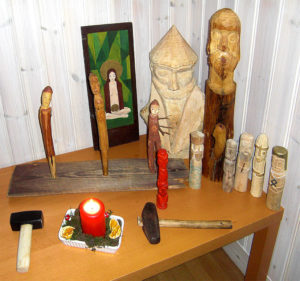 Some Heathens in history incorporated other gods and goddesses into their worship as they learned of them from other tribes, kindreds, and even other ethnicities. The Vanir are probably the best known for this. Some scholars believe that our ancestors added another tribe’s gods and goddesses that became the Vanir. Even when Christianity came to our northern ancestors, many tried to incorporate Jesus as another god in the pantheon. Of course, that didn’t really work too well, but we can see by the Icelandic Cross, jewelry makers were catering to both sides for a while.
Some Heathens in history incorporated other gods and goddesses into their worship as they learned of them from other tribes, kindreds, and even other ethnicities. The Vanir are probably the best known for this. Some scholars believe that our ancestors added another tribe’s gods and goddesses that became the Vanir. Even when Christianity came to our northern ancestors, many tried to incorporate Jesus as another god in the pantheon. Of course, that didn’t really work too well, but we can see by the Icelandic Cross, jewelry makers were catering to both sides for a while.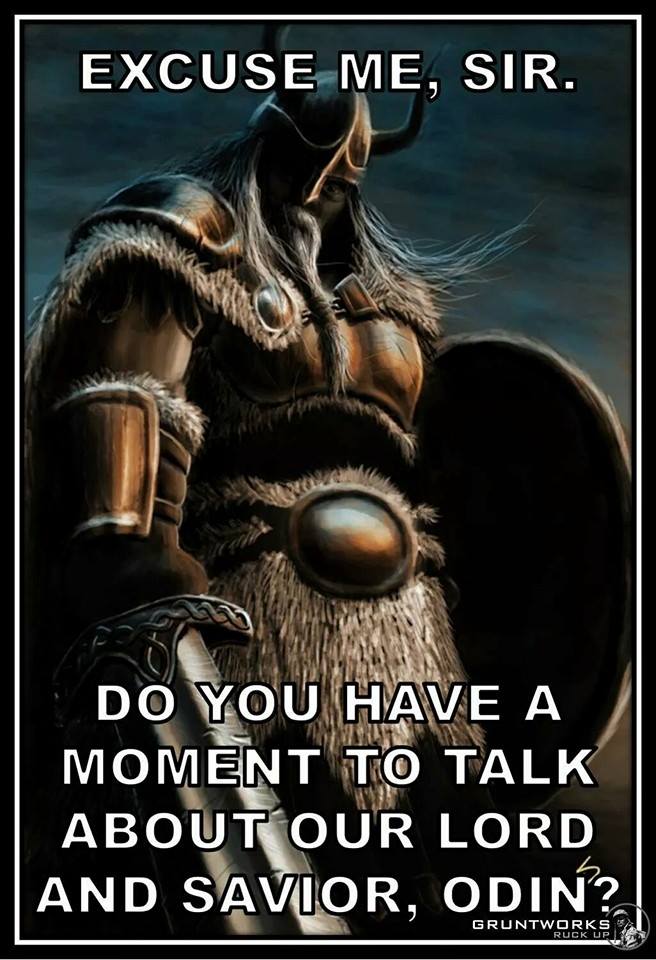 A lot of newbie Heathens tend to go with Odin, Thor, Freyja, or Loki, largely because of popular media. This is fine, and those gods are good within their own rights (although people might argue about Loki), however, that’s pretty much how far those new Heathens take it. They look at Odin as the All-Father in the same way that Christians look at Yahweh as “God the Father.” This comparison is laughable—or, maybe not, given the mercurial temperaments of both deities—when they are different in a number of ways. There are more gods and goddesses that may be far more influential and far more relevant in one’s life than the All-Father.
A lot of newbie Heathens tend to go with Odin, Thor, Freyja, or Loki, largely because of popular media. This is fine, and those gods are good within their own rights (although people might argue about Loki), however, that’s pretty much how far those new Heathens take it. They look at Odin as the All-Father in the same way that Christians look at Yahweh as “God the Father.” This comparison is laughable—or, maybe not, given the mercurial temperaments of both deities—when they are different in a number of ways. There are more gods and goddesses that may be far more influential and far more relevant in one’s life than the All-Father. grandparents, great-grandparents, and so on. They are the people whose blood runs through your veins. Without them, you would not be alive today.
grandparents, great-grandparents, and so on. They are the people whose blood runs through your veins. Without them, you would not be alive today.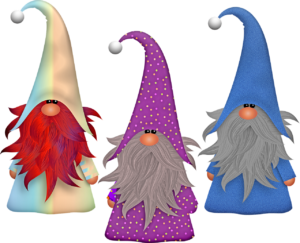 The Wights can be very helpful or harmful, depending on their nature and how you treat them. There are rules to make the Nisse happy, for example. Nisse or Tomte like having porridge with milk and a pat of butter on either Winter Solstice or Christmas, depending on which lore you follow. If you skimp (no butter) or don’t leave the offering, they can cause havoc.
The Wights can be very helpful or harmful, depending on their nature and how you treat them. There are rules to make the Nisse happy, for example. Nisse or Tomte like having porridge with milk and a pat of butter on either Winter Solstice or Christmas, depending on which lore you follow. If you skimp (no butter) or don’t leave the offering, they can cause havoc.


 It’s my guess—and you folks can argue with me over this—that most Heathens are pretty convinced that wights aren’t corporeal creatures, but more likely spirits. Or maybe they consider wights the personification of the natural forces at work. In other words, they aren’t really singular entities. Some people feel that they are ancestors—and yes, there are good cases for this. And some people believe them to be a little below gods. Again, there is a case for that as well.
It’s my guess—and you folks can argue with me over this—that most Heathens are pretty convinced that wights aren’t corporeal creatures, but more likely spirits. Or maybe they consider wights the personification of the natural forces at work. In other words, they aren’t really singular entities. Some people feel that they are ancestors—and yes, there are good cases for this. And some people believe them to be a little below gods. Again, there is a case for that as well.


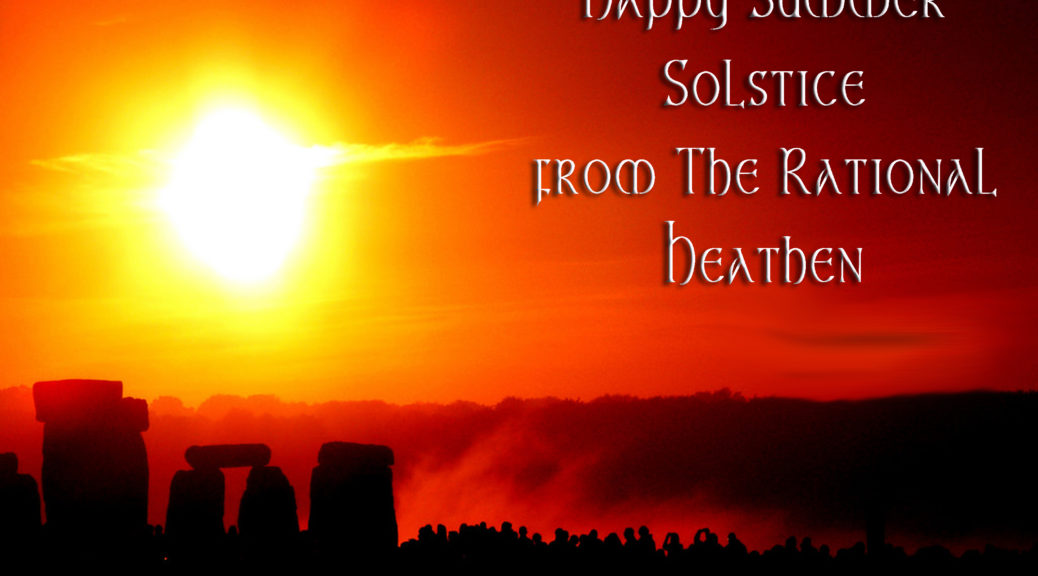
 Okay, this is for those early birds who can get up and greet the new day. Or, for those of us who are night owls, who stay up long enough to see dawn break. The rest of you mere mortals will probably be a bit bleary-eyed for this. Even so, prepare a blot and offer it to Sunna, the wights, the ancestors, and to the gods and goddesses of summer.
Okay, this is for those early birds who can get up and greet the new day. Or, for those of us who are night owls, who stay up long enough to see dawn break. The rest of you mere mortals will probably be a bit bleary-eyed for this. Even so, prepare a blot and offer it to Sunna, the wights, the ancestors, and to the gods and goddesses of summer.
 The best way to celebrate the summer solstice is to get outdoors and do something that helps you enjoy the long daylight. This includes simple things like taking a walk, going hiking, going fishing, or doing some type of activity that involves getting outdoors. With COVID-19, remember to keep your distance from people who are not in your household, and to wear masks if you’re heading somewhere people are present.
The best way to celebrate the summer solstice is to get outdoors and do something that helps you enjoy the long daylight. This includes simple things like taking a walk, going hiking, going fishing, or doing some type of activity that involves getting outdoors. With COVID-19, remember to keep your distance from people who are not in your household, and to wear masks if you’re heading somewhere people are present. You do have a garden, don’t you? Even if it’s only a few herb pots or flowers, give them extra care today. Summer solstice is the longest day of the year when photosynthesis is at its peak due to all that sun. Even if it’s cloudy, the daylight provides extra time for growth.
You do have a garden, don’t you? Even if it’s only a few herb pots or flowers, give them extra care today. Summer solstice is the longest day of the year when photosynthesis is at its peak due to all that sun. Even if it’s cloudy, the daylight provides extra time for growth.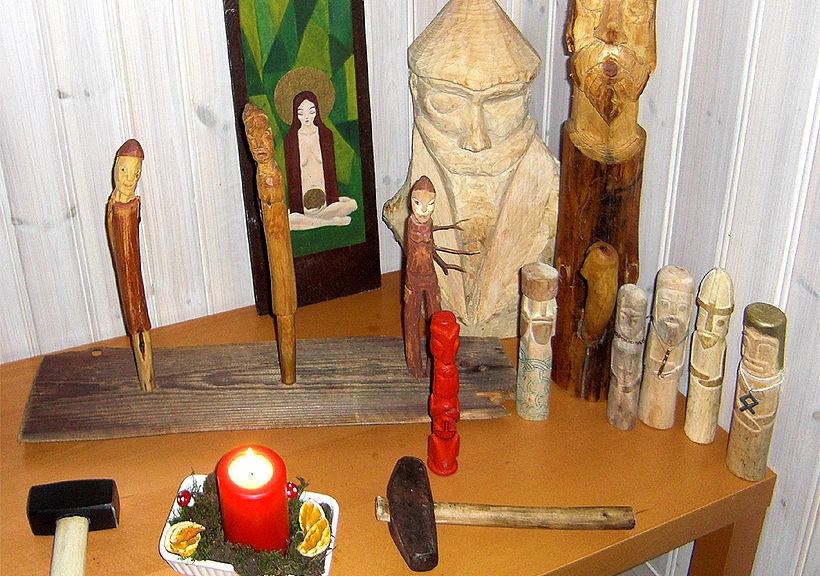
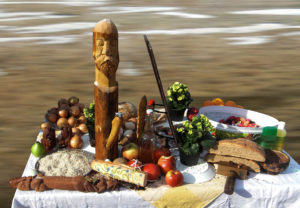 Because of Christianity, we really don’t have much information to go on when it comes to Heathen altars.. We can assume they set altars in the corner of the house. Most likely, they had small statues and other objects that they considered holy. Maybe they were significant to the wights of the area and the gods. Offerings were left at the indoor altar to the gods and local wights. and it was a place to reflect and pray.
Because of Christianity, we really don’t have much information to go on when it comes to Heathen altars.. We can assume they set altars in the corner of the house. Most likely, they had small statues and other objects that they considered holy. Maybe they were significant to the wights of the area and the gods. Offerings were left at the indoor altar to the gods and local wights. and it was a place to reflect and pray.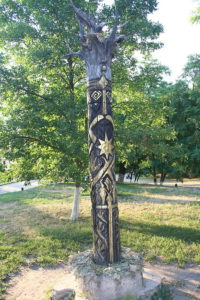 Christianity. As a matter of fact, our ancestors understood thresholds very well. As a result, they ringed their hofs (temples) with fences made from stone or wood. The inside yard, Heathens called a hörgr, and everything within it was considered holy.
Christianity. As a matter of fact, our ancestors understood thresholds very well. As a result, they ringed their hofs (temples) with fences made from stone or wood. The inside yard, Heathens called a hörgr, and everything within it was considered holy.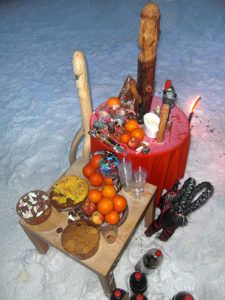 in a special spot in your yard. I’ve heard of people using sticks, or even tongue depressors and drawing the pictures of the gods on them using permanent markers. You can also write the names of the gods you wish to honor on the stick in runes and use them that way.
in a special spot in your yard. I’ve heard of people using sticks, or even tongue depressors and drawing the pictures of the gods on them using permanent markers. You can also write the names of the gods you wish to honor on the stick in runes and use them that way.
 If you even pay attention to the news in a small way, you know the current riots have been precipitated by the death of George Floyd, a black man who died after a police officer knelt on his neck for minutes even after he gasped, “I can’t breathe.” This post has to address that incident before I can get to the issue that also needs addressing: riots. I’ll say right out that cops have some of the most thankless jobs, and most are good people. There are black cops, Hispanic cops, and cops of various minorities. But, there are bad cops too. The police force is made up of people. Some people are good; others bad. It’s just what it is.
If you even pay attention to the news in a small way, you know the current riots have been precipitated by the death of George Floyd, a black man who died after a police officer knelt on his neck for minutes even after he gasped, “I can’t breathe.” This post has to address that incident before I can get to the issue that also needs addressing: riots. I’ll say right out that cops have some of the most thankless jobs, and most are good people. There are black cops, Hispanic cops, and cops of various minorities. But, there are bad cops too. The police force is made up of people. Some people are good; others bad. It’s just what it is. our Constitutional right to protest peacefully. It’s the riots that have me scratching my head.
our Constitutional right to protest peacefully. It’s the riots that have me scratching my head. If you’re anywhere
If you’re anywhere 

 Don’t worry! The Rational Heathen isn’t going anywhere, and my focus and opinions aren’t changing. If anything, I’m coming up with plans to add more content, which means I’m looking to add a group of like-minded writers to the mix of my writing. So, if you’re a Heathen, and you like to WRITE and GET PAID, you need to message me on my Facebook Page (
Don’t worry! The Rational Heathen isn’t going anywhere, and my focus and opinions aren’t changing. If anything, I’m coming up with plans to add more content, which means I’m looking to add a group of like-minded writers to the mix of my writing. So, if you’re a Heathen, and you like to WRITE and GET PAID, you need to message me on my Facebook Page ( First, let me say that there will be plenty of free content for readers. That hasn’t changed. That being said, I have to change around my Patreon plans. I’ve been meaning to do this for some time, but as wonderful as the per-piece Patreon plan for premium content has worked out, the uncertainty leaves many potential patrons at a loss as to how much they’re spending. Going to a month donation will keep it simple, and people can budget for it. As much as this first month is going to hurt me–because my patrons have been switched to a month-only plan–I think in the long run, this is the right step. Time will tell.
First, let me say that there will be plenty of free content for readers. That hasn’t changed. That being said, I have to change around my Patreon plans. I’ve been meaning to do this for some time, but as wonderful as the per-piece Patreon plan for premium content has worked out, the uncertainty leaves many potential patrons at a loss as to how much they’re spending. Going to a month donation will keep it simple, and people can budget for it. As much as this first month is going to hurt me–because my patrons have been switched to a month-only plan–I think in the long run, this is the right step. Time will tell. The Monthly Patreon Plans
The Monthly Patreon Plans This is a gigantic step for me. It will no doubt piss off some of my patrons, but you can probably see that this may actually SAVE you money in the long run. No more “am I getting billed $5 or $10 this month?” or “I can’t figure out how much she will actually produce, or how much it will cost.” Instead, a clear-cut figure. No guesswork.
This is a gigantic step for me. It will no doubt piss off some of my patrons, but you can probably see that this may actually SAVE you money in the long run. No more “am I getting billed $5 or $10 this month?” or “I can’t figure out how much she will actually produce, or how much it will cost.” Instead, a clear-cut figure. No guesswork.






 weather and outdoor activities. This year may be a bit different, though. I’ve promised myself to not make every post about the 800-pound gorilla in the room (Coronavirus/
weather and outdoor activities. This year may be a bit different, though. I’ve promised myself to not make every post about the 800-pound gorilla in the room (Coronavirus/  Get Out and Hunt or Fish
Get Out and Hunt or Fish can plant container gardens and enjoy them. I recommend planting seeds for vegetables and herbs because they’re useful and you can use them in cooking, but you can choose whatever you’d like. Maybe some flowers that will make your place look beautiful?
can plant container gardens and enjoy them. I recommend planting seeds for vegetables and herbs because they’re useful and you can use them in cooking, but you can choose whatever you’d like. Maybe some flowers that will make your place look beautiful? Okay, if you can’t get to your favorite coffee shop, brew up some coffee or tea and sit on the porch or on the balcony and just enjoy the weather. Don’t get too enamored with the Internet, because yes, it will rot your brain. Okay, I don’t have any proof of that, but seriously staying online all the time isn’t good for you. Sit and enjoy the weather and the coffee (or tea). Meditate. Thank the gods you’re not sick, or if you are, do what you can for a speedy recovery.
Okay, if you can’t get to your favorite coffee shop, brew up some coffee or tea and sit on the porch or on the balcony and just enjoy the weather. Don’t get too enamored with the Internet, because yes, it will rot your brain. Okay, I don’t have any proof of that, but seriously staying online all the time isn’t good for you. Sit and enjoy the weather and the coffee (or tea). Meditate. Thank the gods you’re not sick, or if you are, do what you can for a speedy recovery.